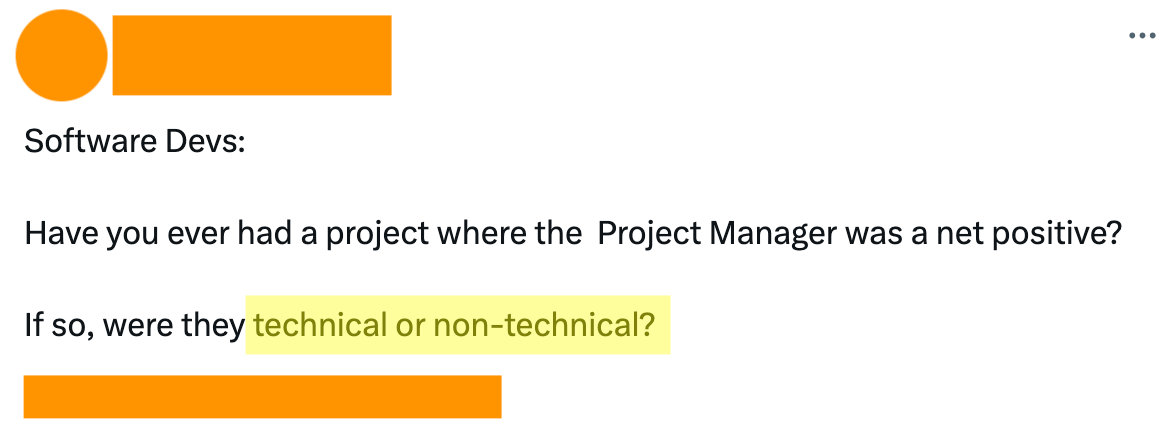Welcome, Hacker News readers! This post hit #1 for a few hours. Wow, there are a lot of you.

The practice of dividing human beings into "technical" or "not technical" has annoyed me for more than ten years, but I've struggled to articulate why. It took a movie about rock climbing, a historic run by the Golden State Warriors, a broken sewing machine, and a serendipitous Slack comment, but I finally put my finger on it. And it's probably not what you think.
I'm going to define "technical" skills and then make the case that they're everywhere and severely underrated. Handwaving over them allows us to dismiss the work of wide swaths of the population. And noticing them will light up your life and unlock new worlds.
❧
The specific moment that forever changed how I saw this came right at the end of the movie Free Solo. It's about the first person to climb up El Capitan without any kind of rope or safety device. As the credits rolled, my friend Sam said something offhand like "it was so cool to see the technical details."
I must have looked blank, because they elaborated: "you usually never get to see behind the scenes and exactly what it takes to prepare to do something that hard—the mental prep, what he eats, even how he positions each finger."
This was a major 🤯 moment. Like the arrow in the Fedex logo, it's one of those things that you just can't unsee.

We usually see the finished, polished work. Or a sanitized "making of" montage. But you so rarely get to see what goes into the final work. That's discussed behind closed doors, between practitioners and their coaches, off the record.
Which is such a shame, because it's so darn interesting.
For instance, the Steph Curry mystery. He is electric: he's been league MVP twice, lead his team to four championships, and is so good at shooting that he's changing the way modern basketball is played.
The mystery is that he didn't start out that way. Sure, he was good enough to get drafted into the NBA, but he was drafted seventh—after two other point guards! Even his dad didn't see it coming:
“In Chicago the other day I saw LaMelo Ball's dad at the game wearing a hat that said: I Told You So,” said Dell [Curry], mentioning the bombastic father of LaMelo and Lonzo.
“Well, my hat would say: I Had No Idea.”
So how did Steph Curry go from a decent NBA shooter to the best all time? Sure, his dad was a pro, he played from a young age, and he had access to coaches—but so do lots of other players who stayed average, including (sorry, Seth Curry!) his brother. What factors and tactics go into that kind of breakthrough?
Also consider that movie, Free Solo. I admit, I thought it was going to be a boring movie. It's about an incredibly risky climb, and I already know the ending: he did the climb and he did not die. But reader...I was riveted and my palms were sweaty. How on earth did the filmmakers do that? So many technical elements must have gone into it—pacing, music, graphics, etc—but I can't even point to them, let alone know how to do them myself.
❧
In software, we have this tempting verbal shorthand. We find ourselves saying things like "she is really technical" or "he is not a technical manager" or "they didn't pass the technical screen." But we only ever use these terms to refer to some underspecified cluster of computer programming or software engineering skills. And people without these skills are labeled "not technical."
But if "technical skills" are the skills we use to produce our work (good software) then by extension, every field has "technical" skills.
They're simply the skills used to produce the work.
Do you know how to frame the story of your product so it resonates, how to figure out what customers want, where and how to put something in a customer's path, and how to tell if it worked? Marketers do.
Do you know how to tell if someone is a good prospect, which people to call first, and what words to use when they're giving you the runaround? Sales people do.
Do you know how to defuse an entrenched argument between coworkers, help a burned out coworker get out of a rut, or tell someone they're not doing a great job without making them furious? Managers do.
Even something as squishy as "good conversationalist" can be broken down into component technical skills, that can then be noticed, admired, emulated, and honed. For instance, great conversationalists know how to:
- prepare before conversations
- ask really good questions
- make others feel heard (note: this not the same thing as "listen accurately")
- handle a conversation partner who doesn't ask you questions back
Just like any other skill, it's one you can break down into pieces to learn and practice.
❧
There are a few major benefits to noticing and unpacking others' technical skill sets.
It makes your world more colorful
Seeing great work is nice, but seeing great work and understanding how hard it was to make is sublime. It lets you appreciate the excellent song, jump shot, or sales call at a new level.
Ignoring the technical skills all around you leads to a duller, more impoverished life. It's simply more interesting to look around with these glasses on.
It helps you learn
To learn a new thing you have to know there is something to learn. If you think that being a good conversationalist is something you just weren't born with, why would you ever try to improve? And if you can't see someone else's greatness, why would you ever think to learn it too?
Noticing new skills is a key component of a growth mindset and a prerequisite to learning.
You won't unwittingly reinforce unpleasant power dynamics
We often dismiss skills that are not societally valued by pretending they are not skills. Or, sure, maybe they're skills, but they're mysterious and ineffable!
You reinforce this idea each time you say "soft skills" instead of working to enumerate them. Perhaps you mean "interpersonal skills," "leadership skills," or "communication skills." These are all technical skills, and they all have names.
You're part of this dynamic if you've ever used strategic incompetence, which is when you let yourself believe that doing laundry, taking meeting notes, or organizing a birthday card for a coworker are things that some people "are naturally good at" and you are "just not good at." Real talk: no one is born knowing how to do these things. They just figure it out and ship it, and you can too.
And consider the "maker movement," which, in my most frustrated moments, I call "arts and crafts, but for boys." The "movement" has been careful to highlight its technical skills to position itself apart from similarly technical fields, like sewing.
You can probably list the "maker" technical skills: electronics, power drilling, cool robots, etc. But can you list the technical skills for sewing? There are a lot.
Let's look at only structural choices, not even going into aesthetic and design skills. You need to pick the right pattern, then pick the fabric that will work structurally for your particular garment. You need to understand the body you are making it for, and the exact complex 3D shape that will fit and flatter them (which in turn requires a 4D understanding of how they'll move, the physics of gravity, and how all that interplays with your fabric selection). Then you need to set up your sewing machine, an inscrutable piece of technical machinery that comes with mineral oil, a screwdriver, a parts catalog for repairs, and a detailed technical manual with lots of component diagrams. When your thread gets tangled, you need to reason about how the machine works to debug it. Then you need to cut things to exactly the right size and assemble them in the right order, and do it skillfully so they hold together while being worn and washed and otherwise under duress. And there are advanced technical details that make the difference between "where did you get that?" and "oh, did you make that?"
And if you want to make something out of t-shirt fabric, that's an entirely different set of equipment and techniques—so much so that the majority of sewists avoid it entirely.
My point is: sewing is very technical.
And we can ONLY write sewing off as "just arts and crafts" and unimpressive compared to the Maker movement if we choose to ignore that sewing is very technical.
Likewise, we can ONLY write off marketing, sales, management, design, product, HR, etc etc etc etc as less important because "they're not technical" if we choose to ignore that they are very technical.
This distinction isn't just about semantics. It's also about value.
Erasing technical skills lets you erase value.
Erasing technical skills lets you erase value
So where does this leave us?
Please let me know in the comments if you have ideas for terminology options to replace "he is not technical" or "technical skills" when we're really talking about software skills. I got feedback from a few readers that they like this argument, but it was useful shorthand, and now they're sad because they're not sure how to be more specific. Fair! Let's brainstorm some options.
❧
Thanks to early readers for their encouragement, feedback, and critique, including a Slack user named Angélique, Laura Duane, Nick Seguin, Laura Lindzey, Fabian Tamp, Zach Lipp, Mindy Preston, Adam Kelly, Alex Chen, Stephanie Losi, Aditya Athalye, Emily Vomacka, Erika Rowland, Marilyn Cole, and probably others that I am forgetting now three months after its original writing. I've heard from so many people that they loved and continue to reference this piece, and I'm not sure I would have left it up without your early reactions. Thank you!
This article was first published in April 2024, and edited for examples, tone, conceptual precision, and structure in July 2024. Its main points have not changed.